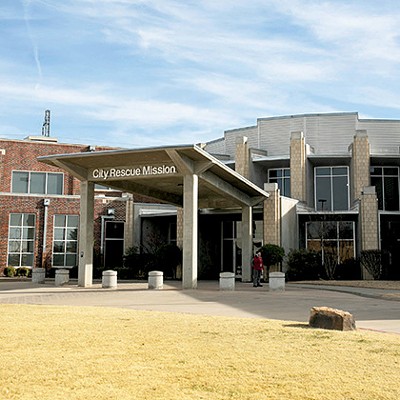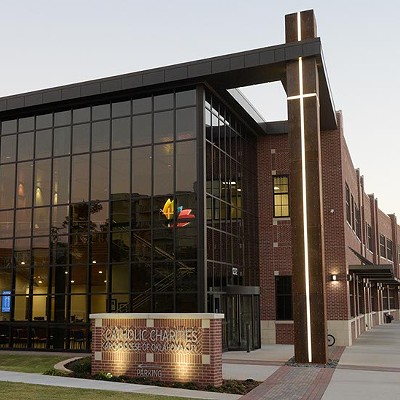
For 45 years, Jesus House has grown synonymous with the care and rehabilitation of Oklahoma City’s downtrodden. Founded by Sister Ruth Wynne and Sister Betty Adams in 1973, the nonprofit began as a ministry dedicated to providing for the homeless. After years of meaningful growth, Jesus House has developed into a premiere outreach program for the impoverished population of the greater metro.
Throughout the organization’s existence, it has transformed from just providing meals to offering a comprehensive program for individuals experiencing hardship. Not only does Jesus House continue to provide support to the homeless, but its support has grown to provide aid to victims of mental illness and addiction.
Recently, Michael Bateman assumed the role of executive director of Jesus House. However, his interest in his cause even preceeds his years as director of operations for the establishment.
“If you’re in social services, you’re in it because you have a heart for the population,” Bateman said. “When I was a kid, my mom, my sister and I volunteered at the Veterans Affairs office, went through nursing homes and handed out sack lunches to people on skid row. My mom instilled in us the necessity of loving and helping people no matter the circumstances.”
During his tenure, Bateman has witnessed Jesus House assist hundreds of thousands of those in need. A fixture of the community, Jesus House has been able to broaden its horizons while still maintaining the mission Wynne and Adams sought years ago.
With this endeavor came a deeper understanding of how to effectively treat those in recovery. Shortly after Bateman became director, he found there was a desperate need for the program to expand.
“The length of our recovery program used to be six months, but now it’s 10 to a year,” Bateman said. “It takes the average addict or someone with mental illness about 10 months for them to feel better and meaningfully improve. The ability to establish a routine, make meetings and maintain a job — it all takes time.”
Previously, Bateman felt though the regimen itself was strong, Jesus House still experienced a questionable number of relapses. However, with the implantation of a longer program, a noticeable reduction of recurring clients occurred. The extension under Bateman instilled a stronger sense of discipline and overall quality of life in those graduating Jesus House. Furthermore, the work of Jesus House’s career development sector has added another dimension to its graduates’ long-term success.
“After a client graduates our program, they move into a six-month transitional period designed to help them develop job and interview skills,” Bateman said. “Afterwards, we help to find them avenues of work, especially if their previous job might not be healthy for them in the long run. We even help them build up a savings account and work towards major transactions like buying a vehicle and getting their own place to live. We really do a lot here.”
Volunteer driven
In the midst of its transformation Jesus House has experienced growth in other sectors as well. In Bateman’s eyes, the program’s outreach has, in turn, led to an influx of civil support.
“I noticed our family feedings have gone up,” Bateman said. “Beyond that, we’ve seen growth in the community outreach we do. More organizations and churches are coming to be involved with us. The word’s been getting out through our Love Thy Neighbor ministry. The work here has just been impactful.”
As a nonprofit, Jesus House’s ability to sustain itself has come largely from a vast network of volunteers. Be it working in a day in their warehouse or orchestrating a massive outreach campaign, the success of Jesus House has always been contingent upon the presence of those striving towards a greater good.
“There is no way we could do this without our volunteers,” Bateman said. “In the kitchen, in the classes, as mentors, we have to have them. It’s awesome to see people who want to serve — individuals, churches and big corporations alike. It’s an absolute blessing.”
Just as Jesus House seeks to improve the lives of those enrolling in its program, so too does the institution better those coming to serve. The ability for Jesus House to retain volunteers and welcome newcomers is pivotal to the establishment’s continued success. Their presence fosters a sense of empathy and obligation within the community, empowering Oklahoma City’s less fortunate in the process.
During his time at Jesus House, Bateman has observed volunteers develop into proactive leaders. Recurring faces often spur a higher rate of effectiveness within Jesus House’s many practices.
“We can always measure the power of our cause by the volunteers we continue to have,” Bateman said. “Over my five years here, we’ve maintained many of the volunteers we had even from before I started. They continue to see our growth and are able to actively to contribute to our success. They may feel blessed to have a little part in this, but I know they are a major impact on our clients.”
Bateman said Jesus House is always seeking volunteers. With additional support, he predicts Jesus House is prime for more significant expansion. However, there are few aspects of the facility that he feels they need to address.
“We’re in a 1938 school building right now,” Bateman said. “Though we’re not looking to move, we still need to update some stuff. We’re still using window units and a boiler system in place of central heating and air, for instance. Beyond our home building, we’re looking to add a few dormitories and a gym and multipurpose building so our clients can exercise better and we can house more people in inclement weather.”
"If you’re in social services, you’re in it because you have a heart forthe population." —Michael Bateman
tweet this
Through the efforts of Jesus House, Bateman has noticed a significant and positive impact on the city. Though Jesus House’s staff efforts are deliberate, the director feels the willingness to give and provide help is second nature to Oklahomans.
“Oklahomans are always willing to give and help,” Bateman said. “Jesus House seeks to grow that very nature in everyone we interact with. As long as I’m blessed enough to be involved with this, we will continue to honor the mission of Sister Ruth and Sister Betty. I absolutely cannot thank our founders and the people of our community enough. We want to be around for another 45 years, and the folks continuing to help us will ensure we get there.”
Over nearly half a century, Jesus House has become one of the most prominent nondenominational Christian outreach programs in the country.
Call 405-232-7164 or visit jesushouseokc.org.












